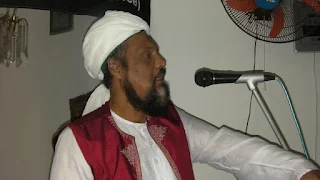On the Advent of Prophet-Reformers in Islam
 'O children of Adam, if there come to you messengers from among you
relating to you My revelations, then whoever fears Allah and reforms
- there will be no fear concerning them, nor will they grieve.”
(Al-Arraf 7: 36).
'O children of Adam, if there come to you messengers from among you
relating to you My revelations, then whoever fears Allah and reforms
- there will be no fear concerning them, nor will they grieve.”
(Al-Arraf 7: 36).
 'O children of Adam, if there come to you messengers from among you
relating to you My revelations, then whoever fears Allah and reforms
- there will be no fear concerning them, nor will they grieve.”
(Al-Arraf 7: 36).
'O children of Adam, if there come to you messengers from among you
relating to you My revelations, then whoever fears Allah and reforms
- there will be no fear concerning them, nor will they grieve.”
(Al-Arraf 7: 36).
This
directive has been given to those who believe in the Holy Quran. When
a prophet is sent among them in the future, they must be careful not
to deny him. On the contrary, they must welcome him with open arms
and reform themselves so as not to be ashamed before God on the Day
of Judgment. But if there was no prophet after the revelation of the
Holy Qur’an, how can one follow this direction found in this same
book? Especially when it teaches us the following prayer:
“Guide us on the right path, the path of those upon whom You have bestowed Your favours.”
“Guide us on the right path, the path of those upon whom You have bestowed Your favours.”
Allah
(swt) here asks us to pray that we should be among those who have
been rewarded by Him. Moreover, the Holy Quran mentions four
dignities that are accessible to those who receive the favours of
Allah (swt), namely: The rank of prophets, the truthful ones, the
martyrs and the pious ones - those who walk on the right way.
“Whoever
obeys Allah and the Messenger ... these are among those upon whom
Allah bestows His blessings, namely, the prophets, the truthful, the
martyrs, and the righteous. And what good companions are these!”
(An-Nisa 4 : 70)
Thus,
of these four categories of rewards, the prophets rank first. How
then can we say that there will be no more prophets in Islam?
Our
Holy Prophet (pbuh) has been called Khataman-Nabiyyine,
and a misinterpretation of this term has given rise to a great
misunderstanding where we have translated it as meaning ‘last
prophet’, while in reality it means
‘seal of the prophets’,
that is, without the seal of Hazrat Muhammad (pbuh) or without his
confirmation [i.e. without any one confirming the fact that he is the
follower of Hazrat Muhammad (pbuh) and Islam, coming as an Islamic
reformer based on Islamic teachings and the approval of Allah], no
prophet can come any more. To become a prophet, one must be a
disciple / follower of the Holy Prophet (pbuh).
Hazrat
Aisha (ra) explained the term “Khataman-Nabiyyine”
in these words: “Say he is
‘Khataman-Nabiyyine’ but do not say that there will be no more
prophets after him.” (Takmila
Majma’ul-Bihar, 85).
To
be the seal of the prophets is an honour, to be the last of the
prophets gives no greatness whatsoever. Hazrat Muhammad (pbuh)
himself said, “I am superior to all
previous and future prophets.”
(Ad-Dailmi)







